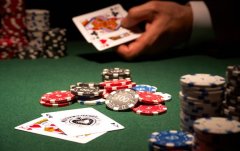基因研究证明,人类天生喜欢赌博
据有关人士估计,赌博恶习的病因大约来自于基因因素和环境因素影响各半,但究竟这些因素如何发挥作用,目前尚未可知。
那么,染上赌博恶习的可能性有多大呢?
据Wendy Slutske,一名来自于Missouri-Columbia大学的教授兼博士及她的同事一起发表在General Psychiatry六月份刊的报道,大约来自于基因和环境因素影响各为50%。
尽管男人有两倍于女人的可能性陷入赌博,女人在就诊的个人中却占比例近半。于是Slutske和她的同事们深入探求了女人赌博的问题--尤其是,基因和环境中哪一样因素对于女人影响更大?
他们的研究群体包括一个来自于澳大利亚双胞胎注册组群中4674人的样本,包括同卵双生和异卵双生的双胞胎,其中57%是女人,平均年龄38岁。
每一个对象均通过一个设计好的电话采访进行调查,采用的是国家鉴定研究中心DSM-IV方法来筛选出赌博问题,它于1999年在美国赌博调查中建立,基于10项DSM-IV诊断原则来对于赌博进行研究。
有3%的男人(2037男人测试对象中70人)和1.3%的女人(2727女人测试对象中34人)被发现呈现出赌博病理。研究人员采用一种称为计量模型的统计程序来测试到底有多少测试对象的赌博问题来自于基因,多少来自环境。结果发现,对于男人来讲是49%对51%,而对于女人,则是52%对48%--换句话说,两项因素对于两性的影响大致相当。
“这项研究首次证实了基因对于女人在赌博成瘾的病因学的影响与男人相当,敏感性基因导致赌博情况发生变异,这在男人和女人方面存在着共性”。研究人员总结道。
挑战性在于,如何去识别形成赌博病理的基因,Slutske告诉《精神病学新闻》杂志。例如,一些多巴胺基因的影响至关重要,但其它一些基因的影响无疑也深具影响。
找出环境因素并减少其对于赌博问题的影响同样重要,她补充说。例如,一些证据表明,很轻易的接触到赌博是一项危险的因素。美国一项调查发现,居住在娱乐场附近的人们更容易染上赌博,但是仍有一些人认为吃角子老虎机是赌博的一种强效可卡因,尽管有看法认为吃角子老虎机比其它形式的赌博更易上瘾,更加深入的因素尚有待研究人员进一步做出研究。
该项研究是由国家健康研究院进行资助的。
Although the etiology of problem gambling is estimated to be about 50 percent genetic and 50 percent environmental the specific genetic or environmental factors at work are not yet clear.
Their cohort included a national sample of 4 674 Australians from the Australian Twin Registry Cohort II. Subjects included both identical and fraternal twins; 57 percent were women. Subjects were on average age 38.
Each subject was evaluated through a structured phone interview regarding problem gambling using the National Opinion Research Center DSM-IV Screen for Gambling Problems which had been developed for an American gambling survey in 1999. It evaluates people for problem gambling on the basis of the 10 DSM-IV diagnostic criteria for it.
Three percent of the men (70 out of 2 037 male subjects) and 1.3 percent of the women (34 out of 2 727 female subjects) were found to have an overall lifetime prevalence of pathological gambling. The researchers then used a statistical procedure called biometric modeling to determine how much of the subjects' gambling problem was due to genes and how much to the environment. The answer was 49 percent genetic and 51 percent environmental for men and 52 percent genetic and 48 percent environmental for women—in other words about equal for both sexes.
“This study establishes for the first time that genes are as important in the etiology of disordered gambling in women as they are in men and that the susceptibility genes contributing to variation in liability for disordered gambling are likely to overlap considerably in men and women ” the researchers concluded.
The challenge now Slutske told Psychiatric News is to identify the genes that contribute to pathological gambling. For example some dopamine genes have already been implicated in the condition she said but other genes are undoubtedly involved as well.
Identification of environmental factors that abet problem gambling is likewise crucial she noted. For instance there is some evidence that easy access to gambling is one such risk factor since “in a national survey conducted in the United States living within close proximity to a casino was associated with higher rates of problem gambling ” she said. “Yet while some people consider slot machines the ‘crack cocaine’ of gambling there is not yet strong evidence to support the idea that slot machine gambling is especially addictive compared to other forms of gambling although more research probably needs to be done…”
The study was funded by the National Institutes of Health.
- 上一篇:马洪刚的另一项事业:劝谏赌徒戒掉赌瘾
- 下一篇:赌徒的个性类型研究
相关推荐
随机专题



 您现在的位置:
您现在的位置: 
 澳门骰宝下注策略
澳门骰宝下注策略 真正过来人的博彩心得,小乐血泪告诉您!
真正过来人的博彩心得,小乐血泪告诉您! 四招赢钱德州扑克策略
四招赢钱德州扑克策略 德州扑克怎么赢钱 德州扑克赢钱的秘诀
德州扑克怎么赢钱 德州扑克赢钱的秘诀


